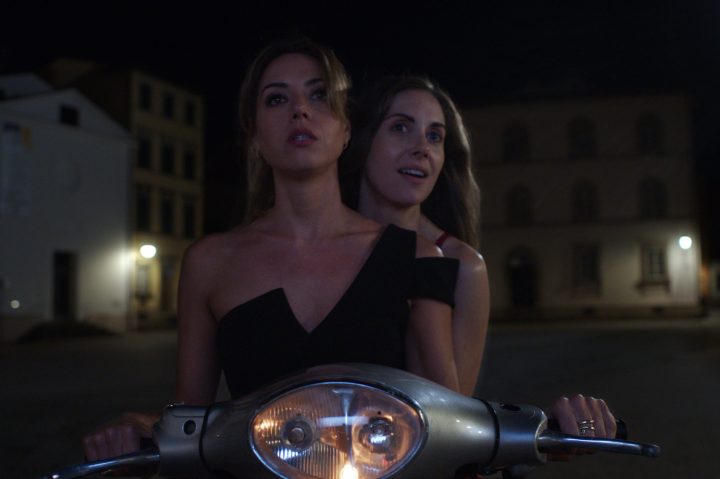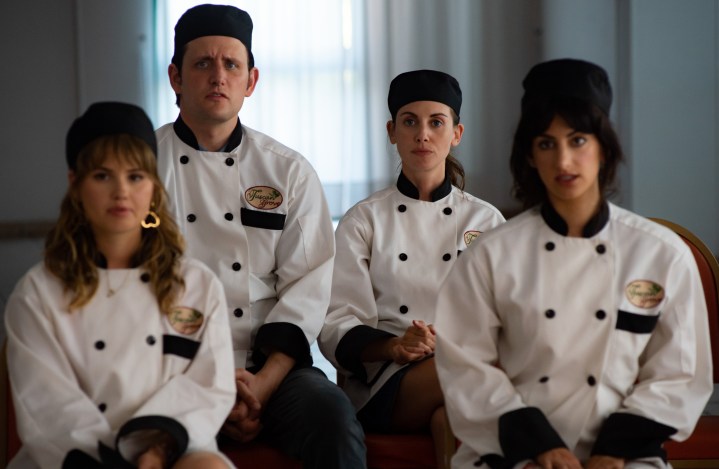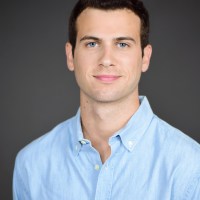In our discussion about his latest project, Spin Me Round, director Jeff Baena does not hold anything back when describing the film’s setting. He loves Italy and everything that comes with it — the food, the people, the culture. After shooting 2017’s The Little Hours in Tuscany, Baena always knew he wanted to go back, so when the opportunity presented itself to return, it was a no-brainer.
Spin Me Round tells the story of Amber (Alison Brie), a restaurant manager chosen to learn at the company’s culinary institute in Italy. While there, she meets Nick Martucci (Alessandro Nivola), the rich, attractive owner of the restaurant chain. As Amber begins to fall for Nick, she uncovers secrets that turn her trip upside down. In conversation with Digital Trends, Baena shares his stance on Italian chain restaurants, why he champions improvisation as a director, and what makes his collaboration with Brie so successful.

Note: This interview has been condensed and edited for length and clarity.
Digital Trends: I have to start with your stance on Italian chain restaurants. Are you a fan of them?
Jeff Baena: In general, I’m not a fan of any chain restaurant. I prefer local and indie cooking.
I’m definitely against Italian chain restaurants, but I’ll go to the burger ones.
Yeah. I mean In-N-Out’s cool when you’re on the road, but honestly, I think when I was 22, I stopped eating fast food. I did an experiment where I took a couple of weeks off because I was probably eating McDonald’s like once a week or something. I waited a couple of weeks, ate it, and just felt it in my system. I was like, “This is definitely not good for you.”
I feel like that’s the right way to do it. Just cut yourself off.
Cold turkey.
You clearly have this affinity towards Italy, since this is your second film set there. What specifically about it is the reason you wanted to return for another film?
I mean, not to knock any other country — because I’m sure every country in the world has its benefits and is beautiful and has its locations that you can’t believe — but for me [with] Italy, I’ve been there a bunch over the last 10 to 15 years. Every time I go there, I’m blown away and learn something new. You go to a new region that you’ve never been to before, and you discover new food, new buildings, new culture, [and] significantly amazing things. I know France probably has that, and I’ve never been to Germany, but Italy, for me specifically, just blows my mind every single time, even when I go to places I’ve been before. I’ve been to Tuscany so many times, and every time I go there, I find a new place.
I went to go visit Aubrey [Plaza]. She was shooting The White Lotus a couple of weeks ago. I’d been to Sicily before, but I still went to Cefalù, which I’d never been to before, and that blew my mind. The Amalfi Coast is incredible. We went to Puglia, which I’d never been to before. It’s insanely beautiful. The people are so kind to me. To me, they have it worked out, like, that’s the place. I’m just drawn to it. I found out a couple of years after I did The Little Hours that my dad’s like 25% Italian, based on 23andMe, which we had no idea. So I guess it’s in the blood.
Do you have a favorite region, in particular?
I’d say everywhere. I mean, I absolutely love Rome, absolutely love Tuscany, love Emilia-Romagna, and I love Sicily. It’s hard, and there [are] still places I haven’t been. I’m sure everywhere I’m going to go, I’m going to be in love with it.

Spin Me Round incorporates a lot of genres and themes into one film. It’s got romance, comedy, satire, and even some whodunit elements. What was the first idea behind this film?
The first idea was after I shot The Little Hours in Italy, I came back and saw this article about a manager from an Italian franchise restaurant who was invited to this program for the top managers in the country to go to Italy to learn about food, wine, and culture — and they were extremely underwhelmed. It was a completely disorganized program. The head chef of the organization made a bolognese and that was pretty much the highlight of the trip. They really didn’t have anything worked out and almost felt like they were trapped in this dormitory.
Italy is one of the most incredible places, and if you’ve never been out of the country, and you go there, it’s mind-blowing. Then to have a completely underwhelming, curated experience where you sort of feel like a prisoner, I thought it was a really funny setup.
You’ve collaborated with a lot of the actors in the ensemble before, like Aubrey Plaza, Molly Shannon, Debby Ryan, and Alison Brie, with the latter serving as a co-writer and co-producer. What’s your collaboration process like with Alison, especially in terms of writing?
So, the difference between this one and Horse Girl is I had sort of been outlining this idea for a while after Italy, and then we worked on our Horse Girl together from scratch, and I was completely blown away by the sort of creative commonalities between us in terms of our sense of humor and our sense of narrative and character. And so, I thought this was sort of a no-brainer to bring her on and have her be involved. We ended up working more on the outline.
The idea was to shoot this in the summer of 2020, and then COVID hit, so we had an extra year to work on it on and off, and [we] wrote it as an actual script instead of an outline. Normally, it would have been an improvised movie, but this was beneficial because we didn’t really have a lot of time to shoot this movie, so we didn’t really have a chance to do my sort of improvised style. We had to pretty much stick to the script, so I think having a fully fleshed-out script really helped us out, given the time crunch that we were under.
You kind of mentioned your improvised style. As a director, how do implement improv with the actors? Do you make sure to get your shots done first, then give the actors some takes to try out different ideas?
In terms of the way I do improvised direction within filmmaking, obviously, there is a limit to how many takes you can do. Generally, per setup, it’s like three or four. There isn’t really a “You do yours, I do mine.” I like to think of myself as a real collaborative director, having discussions with the performers about what the character is and where it’s going and what the story is.
My outlines are not leaving you hanging, and you have to figure this all out for yourself. They’re pretty descriptive. It’s more [that] the dialogue is not spelled out. It’s more like what you’re saying in the scene, but not how to say it. It’s more just sort of an agreement between me and the performer of having the same direction that we’re going in and ultimately being surprised by some of the stuff they bring to the table.
But, at the same time, it’s all within the realm of what we were expecting. It’s not like, “Hey, let’s revise this character, let’s do the scene completely different, and let’s have this thing happen.” It’s more just sort of focusing, and I guess ultimately making it as authentic as possible so that it fits who they are as a person and who their character is.
Sometimes, there’s a massive discrepancy between the way an actor is and the way their character is, which obviously is acting. I think I like to narrow that gap as much as possible so that there is a sort of more true expression, and it makes you feel more comfortable and not have to think on a meta-level about what they’re doing [and] how it’s affecting the character and the story itself.
It’s almost like a more natural performance for the actors.
Yeah, they’re more natural, but at the same time, I like to be surprised. Obviously, if we’re doing funny stuff, for instance, Zach Woods is a genius comedically. And so, some of the stuff that comes out of his mouth is insanely bonkers, but so funny. I welcome that. I’m not precious about the script. I’m precious about the movie, so as long as the movie comes out great, and everyone’s sort of pulling their own weight, then it’s great.
One of the performances that surprised me came from Alessandro. He’s been in dark comedies before, but he’s mostly known for his dramatic work. I think the last thing I saw him in was The Sopranos prequel. But, he looks like the perfect leading man for a rom-com. What stood out about Alessandro during the casting process?
I mean, Alessandro is an incredible actor, and so, I think any time I’m looking to cast someone, I’m looking for great actors who also have a sensitivity to comedy because not everyone can pull off comedy. I think anyone that’s an actor, not that they’re amazing at it, but generally has some proficiency at being able to pull off dramatic roles. Threading that needle between comedy and drama is super hard, and I’ve seen him [Alessandro] do it. After meeting him on Zoom and getting to know him, I got his sense of humor. I made adjustments to the script to match his personality, which is certainly how I work.
Like I said before with the improvisation stuff, my instinct is to not force square people into circular holes; it’s to ultimately find that sort of balance and synergy between their character and their personality themselves. And so, Alessandro, in real life, is a funny, goofy guy who is extremely intelligent and extremely skilled as an actor. He went to Yale. I mean, he knows what he’s doing, and he likes to have lots of conversations about who he is, where he’s coming from, and what this character ultimately is. I love that. I love going deep and geeking out about that process, so he was so fun to work with. I love working with him.
Spin Me Round will be released in theaters, on-



